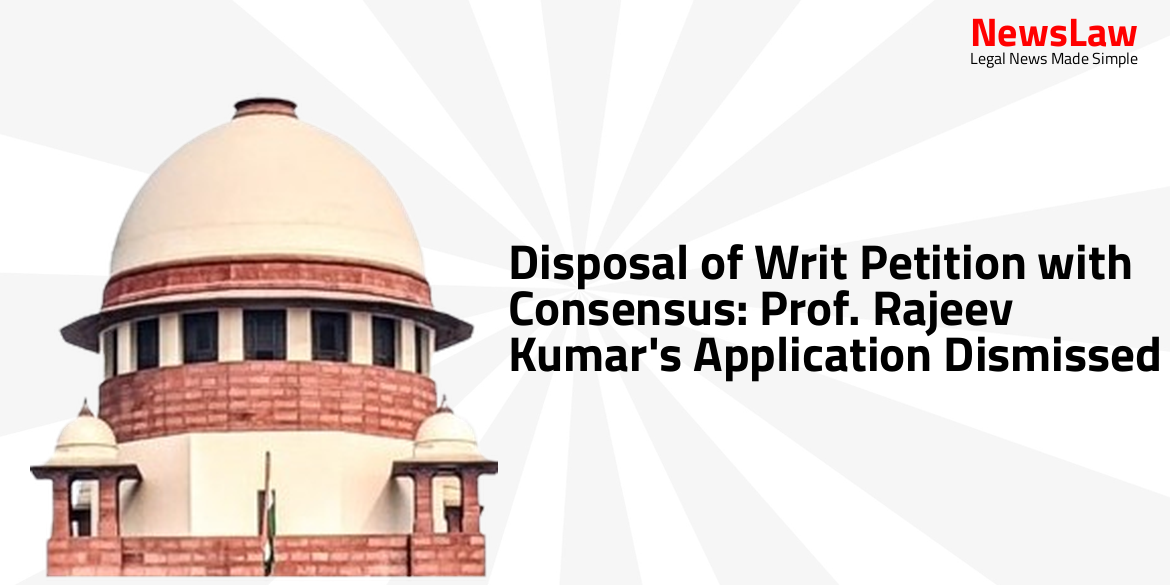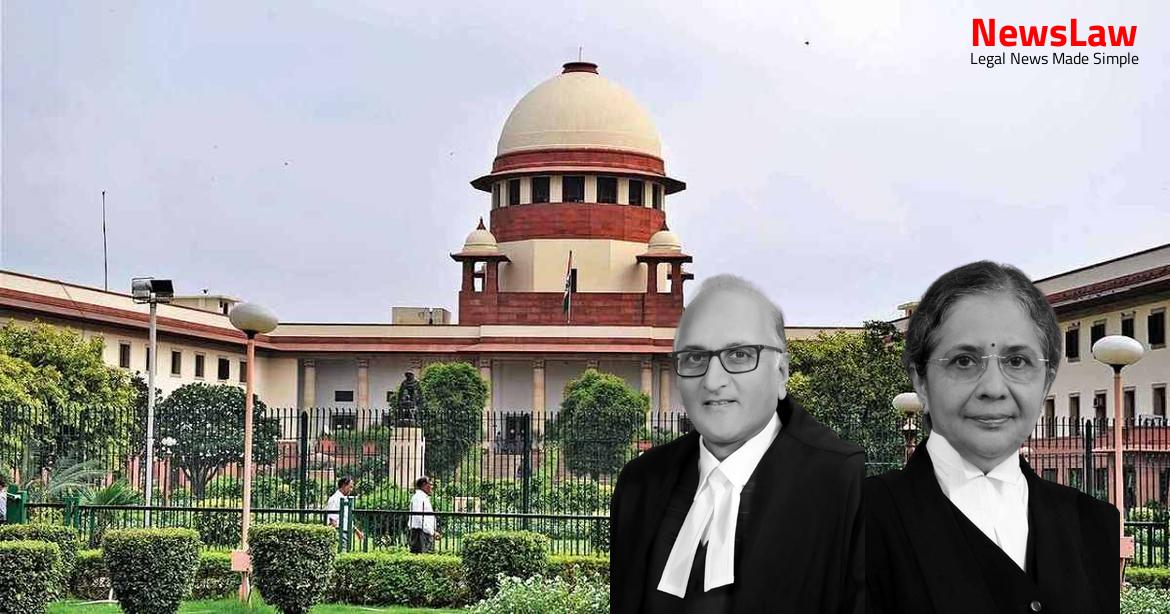In a landmark ruling by the Supreme Court of India, a crucial dispute surrounding a Coal Mining and Delivery Agreement has been resolved. This case involves a detailed examination of the agreement between the parties involved. Stay updated on the detailed analysis and implications of this significant legal decision.
Facts
- A Coal Mining and Delivery Agreement (CMDA) was signed between the appellant and the respondent on 16.07.2008 for coal supply.
- The coal supply was supposed to start within 42 months or by 25.06.2011 from the date of coal block allotment.
- A Joint Venture named Parsa Kente Collieries Limited was formed between Respondent and AEL.
- The CMDA outlined the scope of work in Clause 3.2.1 and the responsibility of the respondent to notify the appellant in advance of coal requirements.
- Letter of Intent was sent to AEL by the respondent on 23.10.2006.
- Arbitration was initiated by the appellant under Clause 10.2 of the CMDA.
- The arbitration led to a direction for the return of the amount in the escrow account deducted from the appellant’s bills.
- Provisions in CMDA related to commencement date, contract price, basic price calculation, price escalation, force majeure, and its effects were discussed.
- The appellant faced a 21-month delay in obtaining forest clearance and environmental clearance.
- A retired Hon’ble Judge of the Rajasthan High Court was appointed as the sole arbitrator.
- The arbitrator determined the date of contract commencement for pricing clauses as 25.06.2011.
- The appellant started coal supply to the respondent from 25.3.2013, after the 21-month delay.
- The learned Arbitrator rejected the claim for ‘Construction of Railway Siding’.
- The award passed by the learned Arbitrator was confirmed by the Commercial Court in Jaipur.
- The respondent appealed to the Commercial Appellate Court/Division Bench of the High Court of Rajasthan at Jaipur under Section 37 of the Arbitration Act.
- The learned Arbitrator determined that the appellant was entitled to the coal price at Rs. 837/- PMT in F.Y. 2013-14, escalating in the subsequent years according to the contract.
- The learned Arbitrator concluded that the zero year for price escalation should be 2011-2012.
- The learned Arbitrator stated that the appellant would be compensated for Rs. 78 crores.
- Regarding the ‘Escrow Account’, the learned Arbitrator specified that any amount forfeited due to the failure of mine closure activity by the appellant could be recovered by the respondent from the monthly bills of the appellant.
Also Read: Address Update Requirement: Legal Implications for Corporate Entities
Arguments
- The appellant contends that the CMDA does not prohibit the appointment of AMPL as a sub-contractor, as approved by the appellant.
- The term ‘commencement date’ is defined as the date when actual coal supply begins.
- The appellant argues that the High Court should not have interfered with the arbitrator’s findings under Section 34 of the Arbitration Act.
- There was a mandatory requirement to lift coal within 3 months of production to prevent hazards to the plant.
- The appellant’s interpretation of clauses of CMDA was deemed plausible by the arbitrator, which should not have been substituted by the High Court.
- The High Court’s interference with the award by the arbitrator is deemed excessive and beyond its jurisdiction.
- The High Court error in rejecting specific claims is highlighted, citing misinterpretation of the CMDA clauses.
- The appellant’s submissions rely on various decisions of the Supreme Court to support their arguments.
- The delay in coal supply due to force majeure is acknowledged, affecting the escalation in price entitlement for the appellant.
- Claims related to fixed costs and escrow account are also elaborated upon by the appellant.
- The High Court’s rejection of certain claims by the appellant is contested on the grounds of misinterpretation and exceeding jurisdiction.
- The impact of commencement date extension on price escalation is a crucial point raised by the appellant.
- In fact, the appellant consented to open the escrow account as required by the Ministry of Coal guidelines.
- The opening of the escrow account was in accordance with clause 3.2.1 of the CMDA.
- The High Court’s decision to disallow the claim made in the escrow account was justified.
- The appellant agreed to the recovery of money from its running bills for deposit into the escrow account.
Also Read: Army Discharge Case: Upholding Justice for Long Service Rendered
Analysis
- The High Court set aside the award passed by the arbitrator regarding the price adjustment/escalation claim, which was confirmed by the Commercial Court.
- The Arbitrator’s interpretation of the relevant clauses for price escalation starting from the date of commencement was found to be both possible and plausible.
- The change in the commencement date due to force majeure did not exempt the appellant from price escalation as there was no specific agreement for the same.
- The purpose of opening the escrow account was to ensure fulfillment of the contract and compliance with Mine Closure guidelines issued by the Ministry of Coal.
- The High Court was not justified in interfering with the Arbitrator’s interpretation of the agreement clauses for price escalation based on the evidence and possibilities presented.
- The High Court correctly set aside the award by the Arbitrator regarding fixed costs and compensation for loss, as it was found to be contrary to the evidence on record.
- The Court must examine if the Division Bench of the High Court exceeded its jurisdiction in setting aside the arbitral award.
- The claims under consideration are price adjustment/escalation, fixed costs, and escrow account.
- The key question is whether the High Court Division was justified in interfering with the award upheld by the Commercial Court in an appeal under Section 37 of the Arbitration Act.
- Decisions of the Court regarding interference with arbitral awards and the limits of this power are crucial in this analysis.
- The Court’s decision in the case of Associate Builders elaborates on the Court’s jurisdiction to interfere with arbitral awards.
- Public policy in India is a significant consideration for interference with arbitral awards, particularly when there is patent illegality.
- Arbitrators must decide in accordance with the contract terms, and reasonable construction by arbitrators does not warrant setting aside an award.
- Courts, when assessing ‘public policy’ in arbitration awards, cannot correct errors of fact as they do not function as appellate courts.
- The High Court rightfully interfered with the arbitrator’s award regarding claim no.3 – escrow account.
- The High Court found the arbitrator’s reasoning to be perverse and irrational, not based on the evidence on record.
- The High Court’s decision was supported by the fact that no reasonable person could have arrived at the arbitrator’s conclusion based on the material presented.
- The Division Bench of the High Court’s opinion was in line with the interference in the award.
- The agreement with the High Court’s decision indicates a sound judgment.
Also Read: Justice Served: Supreme Court Ruling on CBI Inquiry against Army Officer
Decision
- The High Court’s decision to quash and set aside the award by the arbitrator regarding price adjustment/escalation is overturned.
- The award by the arbitrator concerning claim no.1 is reinstated.
- The High Court’s ruling to quash the award by the arbitrator on the other claims – fixed costs and escrow account, is upheld.
- The appeal is partially successful with regard to claim no.1 but unsuccessful on the other claims.
- No costs are awarded in the circumstances of this case.
Case Title: PARSA KENTA COLLIERIES LTD. Vs. RAJASTHAN RAJYA VIDYUT UTPADAN NIGAM LTD.
Case Number: C.A. No.-009023-009023 / 2018



